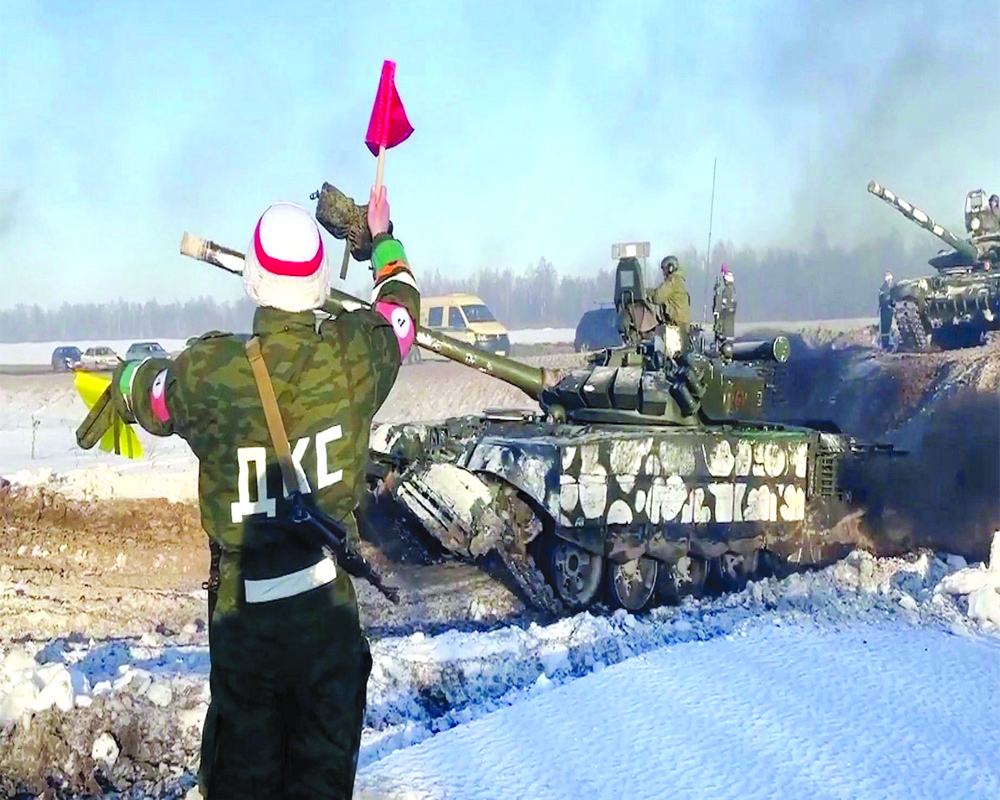Ukraine has been a trial balloon for global geopolitics, and Delhi needs to make copious notes and derive its own lessons from the ongoing saga
February 16 was the much-bandied date of Russian invasion into Ukraine, and as the hair-triggering day passed without an attack by the estimated 1,30,000 Russian troops and weaponry amassed on the border, the world heaved a collective sigh of relief. Temporarily at least, optics of de-escalation, pullback and frenetic engagement ensued — irrespective of the future, Round-1 went to Russia, which achieved its immediate tactical goal without firing a single shot. The sure and bloody price of ever attempting to assert its popular will by the Ukrainians was conveyed in no uncertain terms by Vladimir Putin. This dangerous (though calculated) gambit by Putin had one significant accomplice on his side ie, co-authoritarian China. Both these Cold War warriors share a common threat of encirclement by the US-led ‘Free World’, as indeed perceived efforts to undermine sovereign capability, trade, technology, and possible regime change by colour revolutions. The precursor to the pressure on Ukraine was the joint statement by Vladimir Putin and Xi Jinping who defined their mutual relations as “superior to political and military alliances of the Cold War era” and had tellingly noted that there were “no limits, there are no forbidden areas of cooperation” between the two.
A few weeks earlier, this Russian-Chinese jointsmanship was clearly visible in the brutal muzzling of dissent in Kazakhstan. Amidst this backdrop, pertinent concerns about the nature and resilience of Russian-Chinese relationship, and its augury for India, persist. With violently wounded Indo-Sino Line of Actual Control and continuing tensions — what does it imply for the Russian position on the Indo-Sino freeze and a possible flare-up? Does Putin take his war on the US to the Indian dimension (Delhi is a strategic ally and ‘pivot’ for the US in the region)? After all, the Russian Foreign Minister on a visit to Delhi had called the QUAD (Quadrilateral agreement between US, Japan, Australia and India), the Asian Nato! Or is it just the circumstantial dalliance by the high church of realpolitik ie, China, and an amorally flexible Russia? There is after all a significant backlog of distrust besetting the two authoritarian States, even if routinely played down, such as China’s expansionist ‘nine-dash-line’ formula does encroach Russia’s claim in the Exclusive Economic Zone (EEZ) in the Arctic, it subsumes Russian conglomerate Rosneft’s position in Vietnam.
The global chessboard of geopolitics is not a perfectly aligned circuit of sovereign wirings that disallows any ‘short-circuiting’ — on the contrary, it is rife with contradictions, issue-based cross-purposes and theatre-specific agendas that often generate asymmetric perceptions, if deciphered literally. Turkey as a member of Nato with a US nuclear base on its soil, has defiantly purchased Russian S-400 missile systems (as has India) — this is not to suggest the implosion of Nato or that Turkey joins the Russian bloc in entirety, but a manipulative bargain that is driven by its internal politics and unresolved bilateral/regional/religious issues.
The Sanskrit treatise on statecraft, Arthashastra, positing, ‘The enemy of my enemy is a friend’, is more likely than not the dynamic at play to explain the Russian-Chinese bonhomie. This timeless wisdom platformed the uneasy and unnatural alliance of the western powers and Stalin’s USSR against Nazi Germany in WW2. Post the war, the USSR and China aided North Korea during the Korean War, similarly the Soviet support to a staunchly anti-Communist Gamal Abdul Naseer regime in Egypt to tactically diminish the role of US was symptomatic of this counter-intuitive phenomenon. Even Communist China’s ‘all-weather friendship’ with the Islamic Republic of Pakistan may be foundationally flawed but is situationally tenable in terms of realpolitik pay-off.
The Indian concern needs to be viewed from that lens. For the Chinese, the Ukraine exercise could well be the dry run to test its own future hand in Taiwan to determine the extent of any fallout. Conversely, the Ukrainian drama (following the US humiliation in Afghanistan and the status quo in the Middle Eastern swathes) is also reflective of the demise of classical hegemony, bipolarism or even tripolarism — the geopolitics will move towards ‘circumstantial polarity’ that will be dynamic, situational and forever agitated.
For its part, with historically privileged Indo-Russian relations, Delhi did wise to spout platitudinous neutrality. The calibrated balance sought in its statement that the ‘issue can only be resolved through diplomatic dialogue’, allowed Delhi to offend none. However, the ‘Free World’ should rethink and introspect its own future responses to crises like Ukraine or Taiwan (even the ensuing tension on LAC), given the disunited, dilly-dallying and unimpactful responses of the ‘Free World’ initiatives. For Delhi specifically, times ahead will necessitate fleet-footed diplomacy, pragmatism and professionalism in diplomacy that does rely on personalised equations, preferences or even negative perceptions borne of India’s ‘internal politics’ that invariably alienates as opposed to wins over its neighbourhood. Ukraine has been a trial balloon for geopolitics, and Delhi needs to make copious notes and derive its own lessons.
(The writer, a military veteran, is a former Lt Governor of Andaman & Nicobar Islands and Puducherry. The views expressed are personal.)
























